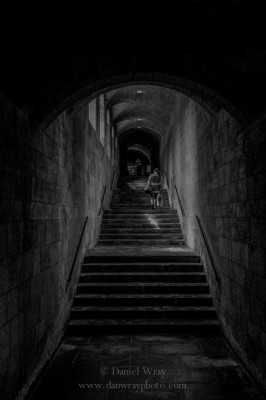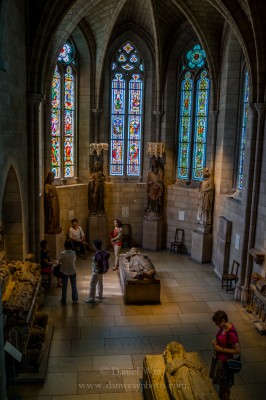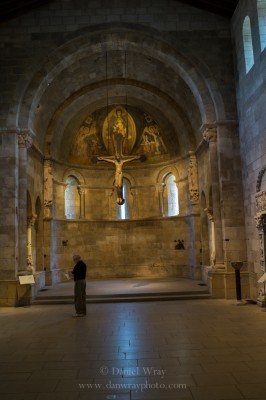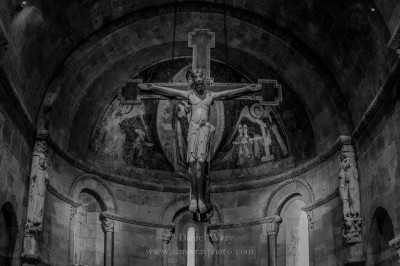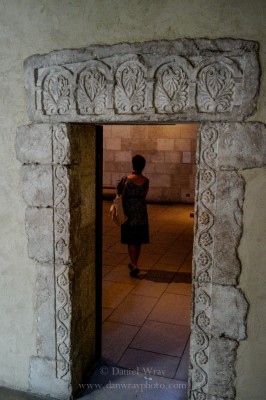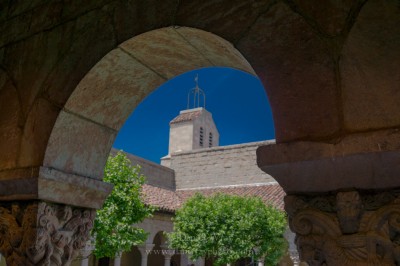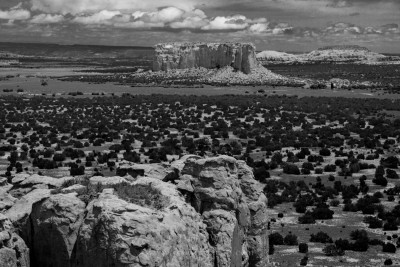It would be an interesting exercise to ask a group of people who are biblically literate what they think is the scariest verse in the Bible. My expectation would be that some passage in the Apocalypse would come to mind. However, I have another opinion on the subject. I think the scariest verse in the Bible may be Isaiah 1:15, “When you spread out your hands in prayer, I look the other way; when you offer your many prayers, I do not listen . . .” (NET Bible) I think there is nothing worse than being ignored, treated as if your words and person are of no account. For me, the idea of being ignored by God, of praying without hope of being heard is the scariest of all thoughts. Any problem can be overcome if God is listening. Just search the Psalms, for example, for the word “hear” and see how often the Psalmist pleads with God to hear him, or confesses his faith that God does hear him. This is the great comfort for all biblical believers; that God hears and is attentive. This is why Jesus offers the comforts that he does by saying we are more valuable than the sparrows, and God takes note of each one of these (Matthew 10:29-31). To be truly heard is to be respected and loved. To be ignored is to be disrespected and perhaps hated, or simply not considered at all. We have all, probably, been ignored by other people in our lives, and it is painful, sometimes intensely so. But to be ignored by God is the same as being cast to the outer darkness. That is why I think Isaiah 1:15 may be the scariest verse in the Bible.
All posts by dwray
The Cloisters
For people of faith and people just interested in historic European religious art and architecture a visit to the Cloisters in northern Manhattan is a must while in the vicinity of New York.
The Metropolitan Museum of Art has gathered relics and parts of monasteries from many places in Europe and the United States into one place and reconstructed them to form a beautiful museum.
The museum contains over 2,000 works of art and most of it dates from the 12th through the 15th century European period.
This is a peaceful place. One could imagine lingering here all day in meditative thought and prayer, or at least serenity of soul and freedom from the pressures and pains of daily life.
I cherish the memory of my visit last year and hope to return soon. In fact I wish I was there right now.
If I lived in NYC visits to the Cloisters would be a regular routine.
Big Country
In the 1958 movie, The Big Country there is a wonderful fight scene between the characters played by Gregory Peck and Charlton Heston. The drama is set up early in the film as a tension is made evident between the ranch foreman (Heston), and the eastern ship’s captain turned westerner (Peck). After considerable escalation of these tensions the Peck character agrees to fight the tough cowboy ranch foreman. But he only agrees to do so on the condition that no one else knows or observes their fight. Here is where it gets cinematically and metaphorically interesting. As they walk out on the vast prairie for the fisticuffs the camera slowly backs away, exposing the enormous landscape that surrounds these two little men with their little grievance pounding each other’s bodies into exhaustion. The symbolism is easy to read.
While I traversed some of the great landscapes of the west this summer I often thought of that scene. The vistas go on seemingly forever out there. This picture from the Acoma reservation in New Mexico captures some of my feeling about this disparity between the smallness of people and the greatness of the land. Can you see the two couples in this scene? As the Psalmist says, “What is Man that you are mindful of him?”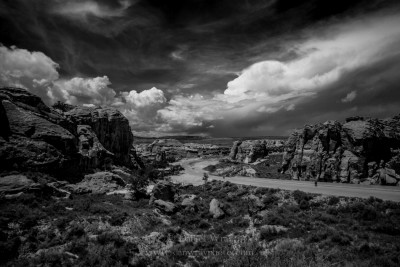
The Funky Bible
If you are interested, as I am, in southern culture and in the late 20th century music scene, then by all means watch the documentary Muscle Shoals. (It is on Netflix) What an interesting story, and especially for me as I just finished reading and reviewing the book Imagine that said so much about the Christian faith and modern music. In the documentary I heard repeatedly the use of the word “funky” to describe the kind of music being produced in Muscle Shoals, Alabama. It is a funny word. One dictionary says it means “earthy” or heavily rhythmic, or even odd and unusual. Is that not the Bible? I do not mean the Bible homogenized and sanitized as from a typical American pulpit. I do not mean the Bible tamed to suit the fashion of some America subculture. I mean the Bible in all its raw power. It is earthy with its honest and sometimes dirty portrayals of the human condition with all its tragedy. It is heavily rhythmic in its drum beat that depicts the bounding, pounding heavy breathing Hound of Heaven relentlessly pursuing the hearts of the people. And it is odd in its portrayal of a profligate God whose grace seems to know no limits. Yes, I think the Bible is funky.
Hope
On a morning news program today they reported a connection between Robin Williams’ Parkinson’s disease and his depression leading to suicide. What struck me in the report was this: the reporter turned to the doctor and said something to the effect that we should give people hope. She responded with some words concerning the treatability of Parkinson’s. Hope was, for me, the operative word in that exchange. Without hope we humans have little to live for. Hopelessness is the great enemy of human happiness. Without hope we may survive, but we cannot thrive.
In the only New Testament effort to define faith in a single sentence, the writer of Hebrews connects faith with hope saying; “Faith is the assurance (hupostasis-that which provides substance) of hope, the certainty of things not seen.” (Hebrews 11:1) Faith and hope are married. If we lose faith we lose hope, and faith is lost if hope is lost. As with everything else in the world this connection is not limited to explicitly religious thought and experience. It applies to all of life because God has designed us that way.
Humans who love and care about this world must be about the work of providing hope to others. So I applaud the broadcaster who thought immediately, let’s give the people hope. Yes, let’s!
Review: The Burning Word
This is not the sort of book I usually read, but when I met and talked with its author this summer at the Glen West conference in Santa Fe, well, I had to read her book. Judith Kunst is a scholar, poet, wife, mother, and biblical explorer (not necessarily in that order). Having grown up in a conservative Christian home she, like many, eventually needed to find her own way with her faith and the Bible. Somewhere in that journey she discovered the Jewish way of Midrash. In an intricately woven account of her scholarly discoveries, mixed with a substantial amount of autobiography, she demonstrates what Christians can learn from their Jewish forerunners, what she calls “the tradition behind my tradition.” That tradition, she says, “celebrates conversation more than information.”
Once I started this book I could hardly put it down. It is fresh, informative and touchingly honest. Perhaps my own love of the book is enhanced by having met its author, but I believe many will appreciate what she offers here without that privilege. The notes and glossary in the back will help those who want to continue the study of Midrash beyond this slim introduction.
[Judith M. Kunst. The Burning Word: A Christian Encounter with Jewish Midrash. Brewer , MA: Paraclete Press. 2006. 151 pages.]
The Death of Robin Williams and the Tragic Sense of Life
Many of us received the news of the (presumed) suicide of Robin Williams this week as a great tragedy. It stands as a landmark for the tragedies that surround us everyday. To live is to witness tragedy. There are the extreme daily tragedies of countries at war. Then there are the smaller tragedies of hopes dashed, of friendships won and then lost, of the breakdown of families, of children cut down or abused before they have a chance to live to majority.
How many can identify with the desire, the powerful urge, to end it all, to go out of this world by personal choice? Some ancient philosophers argued that suicide is a legitimate choice, and should be honored. William James was concerned enough about such talk at Harvard that he delivered a lecture arguing against it. Though Jews and Christians have generally rejected suicide as an immoral act, and even argued about whether it is forgivable, the Bible actually does not directly address the subject. Most interpret the sixth commandment so as to imply its prohibition.
But when a popular figure known for spreading laughter among others, feels so sad that life had lost its luster we cannot but feel that this is a great and tragic loss to us all. Who can fathom the loss of hope in a person that brings them to such a state? How far (or close) are any of us from such a state of mind? I for one am not at all inclined to judge another for such an act. All I can think and feel for them is sadness and empathy. Let God be judge. I want no part in that. I am a man, and all other men are in some way familiar to me.
Even people of faith sometimes fail to draw on the resources of their faith to overcome the hopelessness that leads to death. One would hope that belief in the loving God of the Bible would inspire hope. But the Bible can be a source of discouragement when it is used as an impossible standard of perfection, rather than a means of grace. That grace must be embodied in the flesh of real people who can give it freely to the world around them. The incarnational message of the New Testament is particularly clear about the need for its faithful ones to incarnate the love of God in Christ to a tragically needy world. But here again the burden can be overwhelming. The extent of pain and tragic lives is more than we mortals can bear. So some sincere disciples have removed themselves from the world to pray, and pray we must. Jesus modeled a life of both prayer and labor. We can do no better than to imitate the Master.
The suicide of Robin Williams seems unreasonable to us. This is partly because we think of men as reasoning beings. So let me finish with the insightful words of Miguel de Unamuno: “Man, they say, is a reasoning animal. I do not know why he has not been defined as an affective or feeling animal. And yet what differentiates him from other animals is perhaps feeling rather than reason. I have seen a cat reason more often than laugh or weep. Perhaps it laughs or weeps within itself—but then perhaps within itself a crab solves equations of the second degree.” (The Tragic Sense of Life.)
Death’s Destruction
John 8:48-59
Intro: Last week we looked at the contrast between joy and sorrow with an emphasis upon joy in the New Testament. Today we look at the primary reason for this joy.
I. How Jesus argued with his critics
It is clearly a question of authority.
Jesus’ claims are outrageous. It is no wonder that C. S. Lewis argued that he can only be a liar, lunatic or Son of God. Statements like these leave no room for anything else.
We should take him literally, but realize that he is not describing the experience of the body; but rather, the experience of the spirit. Yes, our bodies will die but for our spirits it will be as if we simply passed through a door from one room to another. {An experience by the way that used to be more commonly witnessed before the age of modern medicine and sedation.} That is why he could say, Don’t fear those who can only kill the body (Luke 12). AS Luther wrote in his great hymn, “The body they may kill; God’s truth abideth still; His kingdom is forever.”
The early Christians were fond of the image of sleep (I Thess. 4:14 “sleep in Jesus”).
Imagine a child lying in bed playing with stuffed animals, she grows tired and does not even notice as she drifts off to sleep. The next thing she knows she is waking up to the morning sun streaming through her bedroom window.
II. A demonstration (John 11):
After raising Lazarus from the dead Jesus said: “Everyone who lives and believes in Me will never die—ever”
III. Another argument with Critics (Sadducees)
Luke 20:27-39 “He is not the God of the dead but of the living, because all are living to Him.” (v.38) God gave us the gift of life. He made us for life not death. The Eagle nebula we spoke of last week with its trillions of miles of gas and dust is nothing compared to the wonderful complexity of a single human being!
IV. On the cross
Luke 23:43 “Today with me you shall be in paradise.”
V. The Apostolic writings:
Given the kind of things Jesus taught it is no wonder that the apostles wrote what they wrote.
II Cor. 5:1-8 bodies as tents! Verse 8 says to go away from the body is to go home to the Lord. Paul adds that this would be pleasing.
My favorite text in this regard is one of the last Paul wrote. It is II Tim. 1:10. In context he is summarizing the Gospel that he proclaims and stressing that he is not ashamed of it. In verse 10 he writes that our Savior Christ Jesus has, on the one hand, abolished death, and on the other hand has brought to light life and immortality.
VI. So it is appropriate that the last book of the Bible introduces the glorified Jesus who says, “I myself am first and last, I was dead and now am living forever, and I have the keys of death and Hades.” (Rev. 1:17 & 18)
Conclusion: Perhaps you feel like the man in Mark 9. He was desperate as he called upon Jesus to help his son, who was demon possessed. Jesus said to him, “Everything is possible to the one who believes.” To this the man replied, “I do believe. Help my unbelief.” (v. 24)
Joy and Sorrow
Intro: I don’t need to say much about sorrow. We are all born into a world with much of it, and we have all tasted of it in our own way, and to varying degrees. Jesus himself was described prophetically as the “man of sorrows” and we all know of his endurance of the sufferings as a man culminating in the cross of Calvary. Yet as Hebrews states, Jesus “endured the cross,” “for the joy that lay before him” (Heb. 12:2). So I will move along this morning to stress the joy that was set before Christ and is set before us.
I. Joy is the natural state of God.
We err when we miss this basic point about the Creator of the heavens and the earth. How easily we skim past the refrain of the creation story, “And God saw that it was good.” It is like the repeated chorus of a song. God delights in the goodness of creation. God’s heavenly creatures sing with joy over the wonder of it all. We are told that there is rejoicing in heaven over every soul that is saved, but there was also rejoicing before there were souls needing saving, because God’s joy was there for all creatures to see.
God lives in the full enjoyment of His creation. The Hubble telescope took pictures of the Eagle Nebula that consists of dust and gas clouds estimated at six trillion miles from top to bottom. God looks upon such things as part of the wonder of what he has done, and at the same time he enjoys the microscopic world of things too small for us to see. He, as Jesus said, notices even the death of a sparrow. He clothes the flowers of the field and when we enjoy their beauty we are reflecting the image of our Creator. Our small bit of enjoyment is a sample of the constant joy of God in all that He has made. Years ago I spoke with a missionary serving in the Brazilian rain forest. As a hobby he had taken an interest in Orchids, something that the rain forest has in abundance. He told me that one of the orchid species he had encountered grows and blossoms entirely underground. God enjoys the orchid blossom that is not visible to the human passing by the spot where it is blossoming beneath the earth.
Jesus lived in the full knowledge of the joy of the triune God. Even in the flesh facing the cross he dwelt in that joy. Think of some of his final words to his apostles in the upper room as recorded by John. He said: “I have spoken these things to you so that My joy may be in you and your joy may be complete.” (Jn. 15:11) What things? Things like,
“I am the true vine” (v. 1).
“If you remain [or, dwell] in Me and My words remain in you, ask whatever you want it will be done for you.” (v. 7).
“AS the Father has loved Me, I have also loved you.” (v.9).
So hold these words near your heart. Knowing he was soon to be arrested and crucified he could speak of “My joy” and want that same joy for his own. Satan in Eden had cast doubts about the benevolent intentions of God for people. He continues to do so. But God has never wavered in His kind and generous intentions for humans, and indeed for his whole creation. But part of that generosity is his willingness to let us be truly free. The joy is for those who want to be the friends of God and desire to obey him (as the remainder of John 15 makes so clear!).
Luke begins his story of Jesus by telling us that he came to bring “good news of great joy” (Lk. 2:10). As we read the apostolic writings we soon discover that they are filled with references to joy. When Paul sets out to summarize the work of the Holy Spirit in us in Galatians 5 he calls that work the “fruits of the Spirit” and the second one after love is joy, joy that is surrounded by love on one side and peace on the other.
Nor is this just a New Testament emphasis. The Psalms are full of joy and rejoicing. The Prophet Isaiah frequently refers to joy. “Shout for joy, you heavens! Earth, rejoice! Mountains break into joyful shouts! For the LORD has comforted His people, and will have compassion on His afflicted ones.” (Is. 49:13) Speaking of a future day Isaiah wrote: “The humble will have joy after joy in the LORD, and the poor people will rejoice in the Holy One of Israel.” (Is. 29:19).
IN a passage that Jesus will allude to in the Gospels (Is. 35 about the blind seeing an the lame walking) we read, “and the redeemed of the LORD will return and come to Zion with singing crowned with unending joy. Joy and gladness will overtake them, and sorrow and sighing will flee.” (v.10).
Applications:
The joyful God is here. He is always near. “Never will I leave you, never will I forsake you” are His words of promise. We are the ones to do not see this. Remember when Elisha was surrounded by enemies in II Kings 6. It is an interesting case to illustrate my point about seeing and not seeing. (Read 6:12-19) The king of Aram was at war with Israel. But here is the key part; to some Elisha said let them see, and to others let them be blind. God wants us to see His presence and know that He who dwells in light unapproachable also dwells with His people, and is available to all who seek him.
We want to be among those to whom he will say, “Share your Master’s joy.” (Mt. 25:21). And again, “Come you who are blessed by My Father, inherit the kingdom prepared for you from the foundation of the world.” (Mt. 25:34).
Self Denial and Self Affirmation
(Psalm 8)
Intro: Like the psalmist in the 8th Psalm, I sometimes find myself contemplating the starry heavens and asking “what is man that you are mindful of him?” This leads to thoughts about another area requiring balance in the Christian’s life: the call to affirm ourselves and to deny ourselves, the call to love ourselves and to confess our depravity.
The ninth commandment says that we are not to bear false witness, and this includes false witness to and about ourselves. The Westminster Larger Catechism addresses this in question145 which says among other things that we violate this commandment by “thinking or speaking too highly or too meanly of ourselves or others . . .”
I. Creation
The biblical creation account places man squarely in the center of God’s plans for planet earth and beyond. Here is the most sublime of stories in which God himself breaths into the humans the breath of life, and makes them, male and female, in his own image and likeness. This is beyond anything to be found anywhere else in all the literature of humanity.
II. Fall
It did not take long for something to go wrong. His glorious creature, the pinnacle of the creation, failed miserably.
1. Adam and Eve acted in accord with self rather than the will of God. (Gen. 3:6)
2. Cain murdered his brother Abel (Gen. 4)
3. Lamech became the model of self-centered sin (Gen. 4:23,24)
4. Babel: “then they said, ‘come let us build ourselves a city, with a tower that reaches to the heavens, so that we may make a name for ourselves . . . “ Gen. 11:4)
5. Jesus’ disciples: “also a dispute arose among them as to which of them was considered to be greatest.” (Luke 22:24)
6. Man of lawlessness: “ He opposes and exalts himself over everything that is called God or is worshiped, and even sets himself up in God’s temple, proclaiming himself to be God.” (II Thess. 2:4)
These are but a few samples of the biblical account of human selfism that replaces the will of God with the will of Man, the love for God with the love for self. The summary prophetic statement concerning this condition is in II Tim. 3 where Paul says that in the last days there will be terrible times, which will include the fact that people will be “lovers of themselves . . . rather than lovers of God.”
This selfism can appear in the church, and we are warned to watch out for the self-deception it brings:
Ps. 36:2 “for in his own eyes he flatters himself too much to detect or hate his sin.”
I Jn. 1:8 “If we claim to be without sin, we deceive ourselves and the truth is not in us.”
Gal. 6:3 “If anyone thinks he is something when he is nothing, he deceives himself.”
Rev. 3:17 to the church at Laodicea, “You say, ‘I am rich; I have acquired wealth and do not need a thing.’ But you do not realize that you are wretched, pitiful, poor, blind and naked.”
And, of course, Jesus said we are to deny ourselves, take up our cross and follow Him.
III. Creation (again) and restoration
Along side all this negative critique of the human condition we must note carefully that humans are still the repositories of God’s image. We are commanded to love others as we love ourselves. In Christ, Paul tells us we are restored to God’s image in “knowledge, righteousness and true holiness.” Thus we are simultaneously called to deny ourselves, to be suspicious of ourselves, and yet to affirm ourselves. When we studied the balance of rest and work we noted that God made the Sabbath for us, and Jesus took time to leave the crowds and seek rest. There is clearly a mandate to take care of our selves as well as others.
The individual and cultural balance we must find here is entirely contextual. What must be emphasized at any particular time depends upon our circumstances. We always must begin where we are. This is why no formula can be offered, no mathematical way to determine what constitutes correct self denial and self affirmation.
I have at times explored some areas of woods and swamp, where people seldom go. To aid in my personal safety I have carried a compass and more recently a GPS. It occurs to me as I use the GPS that it is analogous to life in many ways. This particular device has several built-in programs to give various kinds of information, but its main function is to tell you where you are. But knowing where you are is of minimal value if you do not either have a map, or other entries in the GPS that tell you where you want to be. But no matter where you want to be the GPS always orients you to that place from where you are. You cannot get anyplace except from where you are! Therefore it is essential that the account of where you are is accurate. Do you see this? Years ago one of my seminary professors told us that we should look at what direction a person is going as well a where they are. And wherever we find ourselves it is vital to stay in the action and not drop out of the fellowship of fellow pilgrims.
The shelves of bookstore today are filled with self-help books. The business of liking oneself is an industry today. It is what one Christian author has called “the good news of the psychological gospel.” (Psychological Seduction. 36) Kilpatrick goes on to say, “self-help books, for example, will often start off by asking you to love yourself, but before long they are telling you you’re not responsible for other people and that you shouldn’t waste time living up to others’ expectations.” Most of us know also that ‘feeling good about myself’ is sometimes a handy excuse for doing self-centered or even selfish things.” (36, 37) Liking ourselves does not remove the twist in our nature (37).
“Christianity wants you to feel good about yourself, but not until there is something to feel good about. It would like to get us on the road to recovery before it congratulates us on our good health.” (38)
Yes, we are to love ourselves, but on what grounds? On the grounds that we are created in God’s image and are redeemed and being restored to that image by Christ. Without these reference points it is difficult to see on what basis we should love ourselves. Unless something is built into the GPS that tells it where it is in relation to a larger context of true locations, its news about were it is at the time is of little value. We humans who are to love ourselves and our neighbors likewise need orientation to the source of all directions, the One from whom comes all good destinations, the one who made the directions and the destination. Like a well-made GPS program He has given directions that will lead us back to himself from anywhere.
Conclusion: You may have known where you were yesterday, or in years gone by, but do you know still? You may have had the balance between self-affirmation and humiliation in the past but do you have it now? In the deep woods of the Green Swamp the canopy is at times so thick that the GPS cannot get the relatively weak signals sent by the satellites upon which it depends for orientation. If the signal is lost disorientation sets in. God’s signals are often hindered by obstructions in ourselves or in the world. At such times we need to get a fresh reading, we may have to remove the obstructions, or find a place where we can again receive the precious guidance. This never changes, whether you are a seasoned Christian with much experience or one who is young in faith, there is the constant need of direction from the Source. We’ll give the last words to Paul:
“If anyone thinks he is something when he is nothing, he deceives himself. Each one should test his own actions. Then he can take pride in himself, without comparing himself to somebody else, for each on should carry his own load.” (Gal. 6: 3-5)

